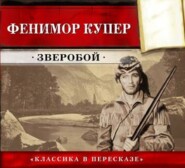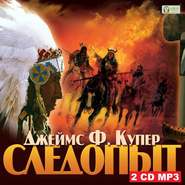По всем вопросам обращайтесь на: info@litportal.ru
(©) 2003-2024.
✖
The Spy: Condensed for use in schools
Настройки чтения
Размер шрифта
Высота строк
Поля
“Frances! Miss Wharton!” exclaimed the youth, springing on his feet and pacing the floor with a cheek that burned through its brown covering, and an eye that sparkled with wounded integrity; “it is not my country, but my honor, that requires the sacrifice. Has he not fled from a guard of my own corps?”
“Peyton, dear Peyton,” said Frances, “would you kill my brother?”
“Would I not die for him?” exclaimed Dunwoodie, as he turned to her more mildly. “You know I would; but I am distracted with the cruel surmise to which this step of Henry’s subjects me. Frances, I leave you with a heavy heart; pity me, but feel no concern for your brother; he must again become a prisoner, but every hair of his head is sacred.”
“Stop! Dunwoodie, I conjure you,” cried Frances, gasping for breath, as she noticed that the hand of the clock still wanted many minutes to the desired hour; “before you go on your errand of fastidious[127 - She thought his sense of duty too exacting.] duty, read this note that Henry has left for you, and which, doubtless, he thought he was writing to the friend of his youth.”
“Where got you this note?” exclaimed the youth, glancing his eyes over its contents. “Poor Henry, you are indeed my friend! If any one wishes me happiness, it is you.”
“He does, he does,” cried Frances, eagerly; “he wishes you every happiness. Believe it; every word is true.”
“I do believe him, lovely girl, and he refers me to you for its confirmation. Would that I could trust equally to your affections!”
“You may, Peyton,” said Frances, looking up with innocent confidence to her lover.
“Then read for yourself, and verify your words,” interrupted Dunwoodie, holding the note towards her.
Frances received it in astonishment, and read the following:
“Life is too precious to be trusted to uncertainties. I leave you, Peyton, unknown to all but Cæsar, and I recommend him to your mercy. But there is a care that weighs me to the earth. Look at my aged and infirm parent. He will be reproached for the supposed crime of his son. Look at those helpless sisters that I leave behind me without a protector. Prove to me that you love us all. Let the clergyman whom you will bring with you unite you this night to Frances, and become at once brother, son, and husband.”
The paper fell from the hands of Frances, and she endeavored to raise her eyes to the face of Dunwoodie, but they sank abashed to the floor.
“Speak, Frances,” murmured Dunwoodie; “may I summon my good kinswoman? Determine, for time presses.”
“Stop, Peyton! I cannot enter into such a solemn engagement with a fraud upon my conscience. I have seen Henry since his escape, and time is all-important to him. Here is my hand; if, with this knowledge of the consequences of delay, you will not reject it, it is freely yours.”
“Reject it!” cried the delighted youth; “I take it as the richest gift of Heaven. There is time enough for us all. Two hours will take me through the hills; and at noon to-morrow I will return with Washington’s pardon for your brother, and Henry will help to enliven our nuptials.”[128 - marriage.]
“Then meet me here in ten minutes,” said Frances, greatly relieved by unburdening her mind, and filled with the hope of securing Henry’s safety, “and I will return and take those vows which will bind me to you forever.”
Dunwoodie paused only to press her to his bosom, and flew to communicate his wishes to the priest.
Dunwoodie and the clergyman were soon there. Frances, silently, and without affectation[129 - pretence.] of reserve, placed in his hand the wedding-ring of her own mother, and after some little time spent in arranging Mr. Wharton and herself, Miss Peyton suffered the ceremony to proceed.
The clock stood directly before the eyes of Frances, and she turned many an anxious glance at the dial; but the solemn language of the priest soon caught her attention, and her mind became intent upon the vows she was uttering. The ceremony was quickly over, and as the clergyman closed the words of benediction the clock told the hour of nine. This was the time that was deemed so important, and Frances felt as if a mighty load was at once removed from her heart.
The noise of a horseman was heard approaching the house, and Dunwoodie was yet taking leave of his bride and aunt, when an officer was shown into the room by his own man.
The gentleman wore the dress of an aid-de-camp, and the major knew him to be one of the military family of Washington.
“Major Dunwoodie,” he said, after bowing to the ladies, “the commander-in-chief has directed me to give you these orders.”
He executed his mission, and, pleading duty, took his leave immediately.
“Here, indeed,” cried the major, “is an unexpected turn in the whole affair. But I understand it: Harper has got my letter, and already we feel his influence.”
“Have you news affecting Henry?” cried Frances, springing to his side.
“Listen, and you shall judge.”
“Sir, – Upon the receipt of this, you will concentrate your squadron, so as to be in front of a covering party which the enemy has sent up in front of his foragers, by ten o’clock to-morrow on the heights of Croton,[130 - a river flowing into the Hudson about thirty-two miles above New York; high ground bordering on this river.] where you will find a body of foot to support you. The escape of the English spy has been reported to me, but his arrest is unimportant, compared with the duty I now assign you. You will, therefore, recall your men, if any are in pursuit, and endeavor to defeat the enemy forthwith. Your obedient servant,
“Geo. Washington.”
“Thank God!” cried Dunwoodie, “my hands are washed of Henry’s recapture; I can now move to my duty with honor.”
“And with prudence, too, dear Peyton,” said Frances, with a face as pale as death. “Remember, Dunwoodie, you leave behind you claims on your life.”
The youth dwelt on her lovely but pallid features with rapture, and, as he folded her to his heart, exclaimed:
“For your sake I will, lovely innocent!” Frances sobbed a moment on his bosom, and he tore himself from her presence.
The peddler and his companion soon reached the valley, and, after pausing to listen, and hearing no sounds which announced that pursuers were abroad, they entered the highway. After walking at a great rate for three hours they suddenly diverged from the road, which inclined to the east, and held their course directly across the hills in a due south direction. This movement was made, the peddler informed his companion, in order to avoid the parties who constantly patrolled in the southern entrance of the Highlands, as well as to shorten the distance by travelling in a straight line.
The peddler became more guarded in the manner in which they proceeded, and took divers precautions to prevent meeting any moving parties of the Americans.
A steep and laborious ascent brought them from the level of the tide-waters to the high lands that form, in this part of the river, the eastern banks of the Hudson. The day was now opened, and objects could be seen in the distance with distinctness. To Henry and the peddler the view displayed only the square yards and lofty masts of a vessel of war riding a few miles below them.
“There, Captain Wharton,” said the peddler – “there is a safe resting-place for you; America has no arm that can reach you if you gain the deck of that ship.”
By following the bank of the river, Birch led the way free from observation until they reached a point opposite to the frigate,[131 - a ship of war.] when, by making a signal, a boat was induced to approach.
Some time was spent and much precaution used before the seamen would trust themselves ashore; but Henry having finally succeeded in making the officer in command of the party credit his assertions, he was able to rejoin his companions in arms in safety.
Before taking leave of Birch, the captain handed him his purse, which was tolerably well supplied for the times.
The boat pulled from the shore, and Birch turned on his heel, drawing his breath like one relieved, and shot up the hills with the strides for which he was famous.
CHAPTER XXIII.
WASHINGTON’S LAST MEETING WITH THE SPY
It was at the close of a stormy day in September that a large assemblage of officers was collected near the door of a building that was situated in the heart of the American troops, who held the Jerseys. The age, the dress, and the dignity of deportment of most of these warriors indicated them to be of high rank, but to one in particular was paid a deference[132 - respect.] and obedience that announced him to be of the highest. His dress was plain, but it bore the usual military distinctions of command. He was mounted on a noble steed of a deep bay, and a group of young men, in gayer attire, evidently awaited his pleasure and did his bidding. Many a hat was lifted as its owner addressed this officer, and when he spoke, a profound attention, exceeding the respect of mere professional etiquette,[133 - forms required by good breeding.] was exhibited on every countenance. At length the general raised his own hat and bowed gravely to all around him. The salute was returned, and the party dispersed, leaving the officer without a single attendant except his body servants and one aid-de-camp. Dismounting, he stepped back a few paces, and for a moment viewed the condition of his horse with the eye of one who well understood the animal; then, casting a brief but expressive glance at his aid, he retired into the building, followed by that gentleman.
On entering the apartment that was apparently fitted for his reception, he took a seat, and continued for a long time in a thoughtful attitude, like one in the habit of communing much with himself. During this silence, the aid-de-camp stood in expectation of orders. At length the general raised his eyes, and spoke in those low, placid tones that seemed natural to him:
“Has the man I wished to see arrived, sir?”
“He waits the pleasure of your excellency.”
“I will receive him here, and alone, if you please.”
The aid bowed and withdrew. In a few minutes the door again opened, and a figure, gliding into the apartment, stood modestly at a distance from the general, without speaking. His entrance was unheard by the officer, who sat gazing at the fire, still absorbed in his own meditations. Several minutes passed, when he spoke to himself in an undertone:
“To-morrow we must raise the curtain, and expose our plans. May Heaven prosper them!”
“Harvey Birch,” he said, turning to the stranger, “the time has arrived when our connection must cease; henceforth and forever we must be strangers.”
“Peyton, dear Peyton,” said Frances, “would you kill my brother?”
“Would I not die for him?” exclaimed Dunwoodie, as he turned to her more mildly. “You know I would; but I am distracted with the cruel surmise to which this step of Henry’s subjects me. Frances, I leave you with a heavy heart; pity me, but feel no concern for your brother; he must again become a prisoner, but every hair of his head is sacred.”
“Stop! Dunwoodie, I conjure you,” cried Frances, gasping for breath, as she noticed that the hand of the clock still wanted many minutes to the desired hour; “before you go on your errand of fastidious[127 - She thought his sense of duty too exacting.] duty, read this note that Henry has left for you, and which, doubtless, he thought he was writing to the friend of his youth.”
“Where got you this note?” exclaimed the youth, glancing his eyes over its contents. “Poor Henry, you are indeed my friend! If any one wishes me happiness, it is you.”
“He does, he does,” cried Frances, eagerly; “he wishes you every happiness. Believe it; every word is true.”
“I do believe him, lovely girl, and he refers me to you for its confirmation. Would that I could trust equally to your affections!”
“You may, Peyton,” said Frances, looking up with innocent confidence to her lover.
“Then read for yourself, and verify your words,” interrupted Dunwoodie, holding the note towards her.
Frances received it in astonishment, and read the following:
“Life is too precious to be trusted to uncertainties. I leave you, Peyton, unknown to all but Cæsar, and I recommend him to your mercy. But there is a care that weighs me to the earth. Look at my aged and infirm parent. He will be reproached for the supposed crime of his son. Look at those helpless sisters that I leave behind me without a protector. Prove to me that you love us all. Let the clergyman whom you will bring with you unite you this night to Frances, and become at once brother, son, and husband.”
The paper fell from the hands of Frances, and she endeavored to raise her eyes to the face of Dunwoodie, but they sank abashed to the floor.
“Speak, Frances,” murmured Dunwoodie; “may I summon my good kinswoman? Determine, for time presses.”
“Stop, Peyton! I cannot enter into such a solemn engagement with a fraud upon my conscience. I have seen Henry since his escape, and time is all-important to him. Here is my hand; if, with this knowledge of the consequences of delay, you will not reject it, it is freely yours.”
“Reject it!” cried the delighted youth; “I take it as the richest gift of Heaven. There is time enough for us all. Two hours will take me through the hills; and at noon to-morrow I will return with Washington’s pardon for your brother, and Henry will help to enliven our nuptials.”[128 - marriage.]
“Then meet me here in ten minutes,” said Frances, greatly relieved by unburdening her mind, and filled with the hope of securing Henry’s safety, “and I will return and take those vows which will bind me to you forever.”
Dunwoodie paused only to press her to his bosom, and flew to communicate his wishes to the priest.
Dunwoodie and the clergyman were soon there. Frances, silently, and without affectation[129 - pretence.] of reserve, placed in his hand the wedding-ring of her own mother, and after some little time spent in arranging Mr. Wharton and herself, Miss Peyton suffered the ceremony to proceed.
The clock stood directly before the eyes of Frances, and she turned many an anxious glance at the dial; but the solemn language of the priest soon caught her attention, and her mind became intent upon the vows she was uttering. The ceremony was quickly over, and as the clergyman closed the words of benediction the clock told the hour of nine. This was the time that was deemed so important, and Frances felt as if a mighty load was at once removed from her heart.
The noise of a horseman was heard approaching the house, and Dunwoodie was yet taking leave of his bride and aunt, when an officer was shown into the room by his own man.
The gentleman wore the dress of an aid-de-camp, and the major knew him to be one of the military family of Washington.
“Major Dunwoodie,” he said, after bowing to the ladies, “the commander-in-chief has directed me to give you these orders.”
He executed his mission, and, pleading duty, took his leave immediately.
“Here, indeed,” cried the major, “is an unexpected turn in the whole affair. But I understand it: Harper has got my letter, and already we feel his influence.”
“Have you news affecting Henry?” cried Frances, springing to his side.
“Listen, and you shall judge.”
“Sir, – Upon the receipt of this, you will concentrate your squadron, so as to be in front of a covering party which the enemy has sent up in front of his foragers, by ten o’clock to-morrow on the heights of Croton,[130 - a river flowing into the Hudson about thirty-two miles above New York; high ground bordering on this river.] where you will find a body of foot to support you. The escape of the English spy has been reported to me, but his arrest is unimportant, compared with the duty I now assign you. You will, therefore, recall your men, if any are in pursuit, and endeavor to defeat the enemy forthwith. Your obedient servant,
“Geo. Washington.”
“Thank God!” cried Dunwoodie, “my hands are washed of Henry’s recapture; I can now move to my duty with honor.”
“And with prudence, too, dear Peyton,” said Frances, with a face as pale as death. “Remember, Dunwoodie, you leave behind you claims on your life.”
The youth dwelt on her lovely but pallid features with rapture, and, as he folded her to his heart, exclaimed:
“For your sake I will, lovely innocent!” Frances sobbed a moment on his bosom, and he tore himself from her presence.
The peddler and his companion soon reached the valley, and, after pausing to listen, and hearing no sounds which announced that pursuers were abroad, they entered the highway. After walking at a great rate for three hours they suddenly diverged from the road, which inclined to the east, and held their course directly across the hills in a due south direction. This movement was made, the peddler informed his companion, in order to avoid the parties who constantly patrolled in the southern entrance of the Highlands, as well as to shorten the distance by travelling in a straight line.
The peddler became more guarded in the manner in which they proceeded, and took divers precautions to prevent meeting any moving parties of the Americans.
A steep and laborious ascent brought them from the level of the tide-waters to the high lands that form, in this part of the river, the eastern banks of the Hudson. The day was now opened, and objects could be seen in the distance with distinctness. To Henry and the peddler the view displayed only the square yards and lofty masts of a vessel of war riding a few miles below them.
“There, Captain Wharton,” said the peddler – “there is a safe resting-place for you; America has no arm that can reach you if you gain the deck of that ship.”
By following the bank of the river, Birch led the way free from observation until they reached a point opposite to the frigate,[131 - a ship of war.] when, by making a signal, a boat was induced to approach.
Some time was spent and much precaution used before the seamen would trust themselves ashore; but Henry having finally succeeded in making the officer in command of the party credit his assertions, he was able to rejoin his companions in arms in safety.
Before taking leave of Birch, the captain handed him his purse, which was tolerably well supplied for the times.
The boat pulled from the shore, and Birch turned on his heel, drawing his breath like one relieved, and shot up the hills with the strides for which he was famous.
CHAPTER XXIII.
WASHINGTON’S LAST MEETING WITH THE SPY
It was at the close of a stormy day in September that a large assemblage of officers was collected near the door of a building that was situated in the heart of the American troops, who held the Jerseys. The age, the dress, and the dignity of deportment of most of these warriors indicated them to be of high rank, but to one in particular was paid a deference[132 - respect.] and obedience that announced him to be of the highest. His dress was plain, but it bore the usual military distinctions of command. He was mounted on a noble steed of a deep bay, and a group of young men, in gayer attire, evidently awaited his pleasure and did his bidding. Many a hat was lifted as its owner addressed this officer, and when he spoke, a profound attention, exceeding the respect of mere professional etiquette,[133 - forms required by good breeding.] was exhibited on every countenance. At length the general raised his own hat and bowed gravely to all around him. The salute was returned, and the party dispersed, leaving the officer without a single attendant except his body servants and one aid-de-camp. Dismounting, he stepped back a few paces, and for a moment viewed the condition of his horse with the eye of one who well understood the animal; then, casting a brief but expressive glance at his aid, he retired into the building, followed by that gentleman.
On entering the apartment that was apparently fitted for his reception, he took a seat, and continued for a long time in a thoughtful attitude, like one in the habit of communing much with himself. During this silence, the aid-de-camp stood in expectation of orders. At length the general raised his eyes, and spoke in those low, placid tones that seemed natural to him:
“Has the man I wished to see arrived, sir?”
“He waits the pleasure of your excellency.”
“I will receive him here, and alone, if you please.”
The aid bowed and withdrew. In a few minutes the door again opened, and a figure, gliding into the apartment, stood modestly at a distance from the general, without speaking. His entrance was unheard by the officer, who sat gazing at the fire, still absorbed in his own meditations. Several minutes passed, when he spoke to himself in an undertone:
“To-morrow we must raise the curtain, and expose our plans. May Heaven prosper them!”
“Harvey Birch,” he said, turning to the stranger, “the time has arrived when our connection must cease; henceforth and forever we must be strangers.”

















